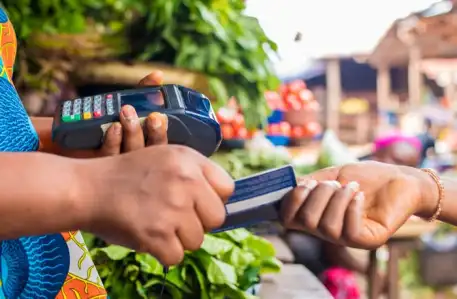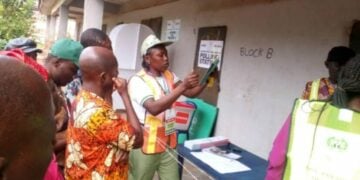A 42-year-old textile dealer in Bauchi, Adamu Yusuf, reached for his smartphone with anxiety and anticipation on a sweltering afternoon. Earlier, a customer had left his shop, promising to send money for a bulk order. Minutes later, a ping confirmed the transfer. Yusuf exhaled, his face breaking into a smile. “I can’t imagine life and business without NIP,” he said, referring to the Nigeria Instant Payment system.
Yusuf is already dreaming bigger. With plans to expand his fabric business, he said NIP would remain his lifeline. “It’s not just a payment system; it’s my partner,” he declared, holding up his smartphone like a trophy.
In Kano’s Kantin Kwari Market, the largest textile hub in Africa, the story is not different. A textile merchant in her late thirties, Amina Ali, narrated how NIP has helped her business.
“Before, I had to wait endlessly for payments to clear. Sometimes, customers would claim they’d sent money, but I couldn’t confirm,” she explained. “Now, it’s instant with NIP. There’s no room for excuses.”
The streets of Kano tell a similar story of transformation among residents. From market stalls to corporate offices, NIP has become an indispensable tool, bridging gaps and empowering people. At Kantin Kwari, Amina reflected on how far she’s come. “There’s no going back,” she said confidently, adding that “NIP has changed everything.”
To both Yusuf and Ali and millions like them, NIP has transformed their lives and businesses. Launched by the Nigerian Inter-Bank Settlement System (NIBSS) in 2011 as digital public infrastructure, NIP enables account-number-based real-time inter-bank payment solutions, making it a linchpin of Nigeria’s financial ecosystem. Transactions that once took hours, or even days, are now completed in seconds and the value is instantly reflected at the receiving account.
Over the last three years, the impact of NIP has been staggering. According to data from the NIBSS, the volume of transactions has skyrocketed, reflecting a growing trust in the system. In 2022, over 3.5 billion transactions worth N345 trillion were processed through NIP. By 2023, this figure had surged to nearly 5 billion transactions valued at N343.94 trillion. In 2024, NIP volume stood at 5.6 billion transactions worth over N476.89 billion.
The seamless operation of NIP is underpinned by cutting-edge technology and collaboration among Nigeria’s financial institutions. When a user initiates a transfer, the request is routed through the NIBSS platform, which verifies the sender’s account and credit-worthiness. Once confirmed, the funds are instantly debited and credited to the recipient’s account, all within seconds. This efficiency has made NIP the backbone of Nigeria’s cashless policy, which aims to reduce reliance on physical cash and promote financial inclusion.
LEADERSHIP Weekend gathered that Nigeria’s NIP not only lead similar African payment platforms but also competes well globally. Nigeria’s NIP ranks as the world’s sixth-largest real-time payments system, ahead of the US. According to the ‘2024 State of Inclusive Instant Payment System in Africa’ released by AfricaNenda Foundation, NIP has the potential to mature in the short term and long run, having integrated all cross-domain platforms and allowing for cross-border payments.
As the volume of transactions continues to soar, so does optimism for what lies ahead. NIP has not only made payments faster and safer but has also reshaped the way Nigerians interact with money. In Bauchi and Kano, the system’s ripple effect is evident in users’ confidence, the growth of small businesses and the economic stability it fosters.
But the story of NIP is not just about numbers; it’s about people. In Bauchi, farmers like Abubakar Sani now receive payments directly into their accounts. “I used to carry cash to the market and worry all the way,” Abubakar said, sitting under a mango tree in his native Boto, a community in Tafawa Balewa local government. “Now, I get paid before the truck even leaves my farm courtesy of NIP.”
In Kano, the story of 28-year-old Zainab Ibrahim is particularly compelling. A graduate of Economics, Zainab ventured into e-commerce with NIP as her payment gateway. She managed to scale her business, reaching customers in Lagos, Abuja and beyond. “NIP gave me the confidence to operate nationwide,” she said, adding that, “I can deliver my products knowing payments are guaranteed.”
Despite its transformative impact, NIP is not without challenges. Instances of failed transactions could disrupt business operations and distort people’s lives. Additionally, financial literacy remains a barrier, particularly in rural northern Nigeria. Many potential users are unaware of the benefits or lack access to the technology needed to utilise the service. Transaction charges also scare potential users.
A financial technology expert and lecturer at the Federal Polytechnic Bauchi, Muhammad Uwais, believes that these hurdles are surmountable. “NIP is a game-changer for Nigeria’s economy, but its full potential will only be realised when everyone, including rural dwellers, understands and trusts the system. The government and financial institutions need to invest more in education and infrastructure.”
Uwais pointed out that the rise in NIP transactions also signals a broader economic shift. “This isn’t just about convenience. It’s about building trust in the financial system and fostering a culture of transparency. The more people use digital payments, the more we formalise the economy,” he explained.
To Nigerians, NIP is more than just a financial service; it’s a symbol of progress, proving that even in the face of challenges, innovation has the power to transform lives.
When contacted for comments, the head of Marketing Communications at the Nigeria Inter-Bank Settlement System (NIBSS), Mrs Lilian Phido, requested this reporter to send his questions to an email address she shared. Consequently, on April 8, the reporter requested for response to three questions about the challenges of NIP; how NIP supports and drives financial inclusion and the level of acceptance and penetration of NIP in northern Nigerian communities. Having received no response seven days after sending out the request, this reporter reminded Mrs Phido on April 14, yet to no avail.
–This report is produced as part of the DPI Africa Journalism Fellowship Programme, a collaboration between the Media Foundation for West Africa and Co-develop.





